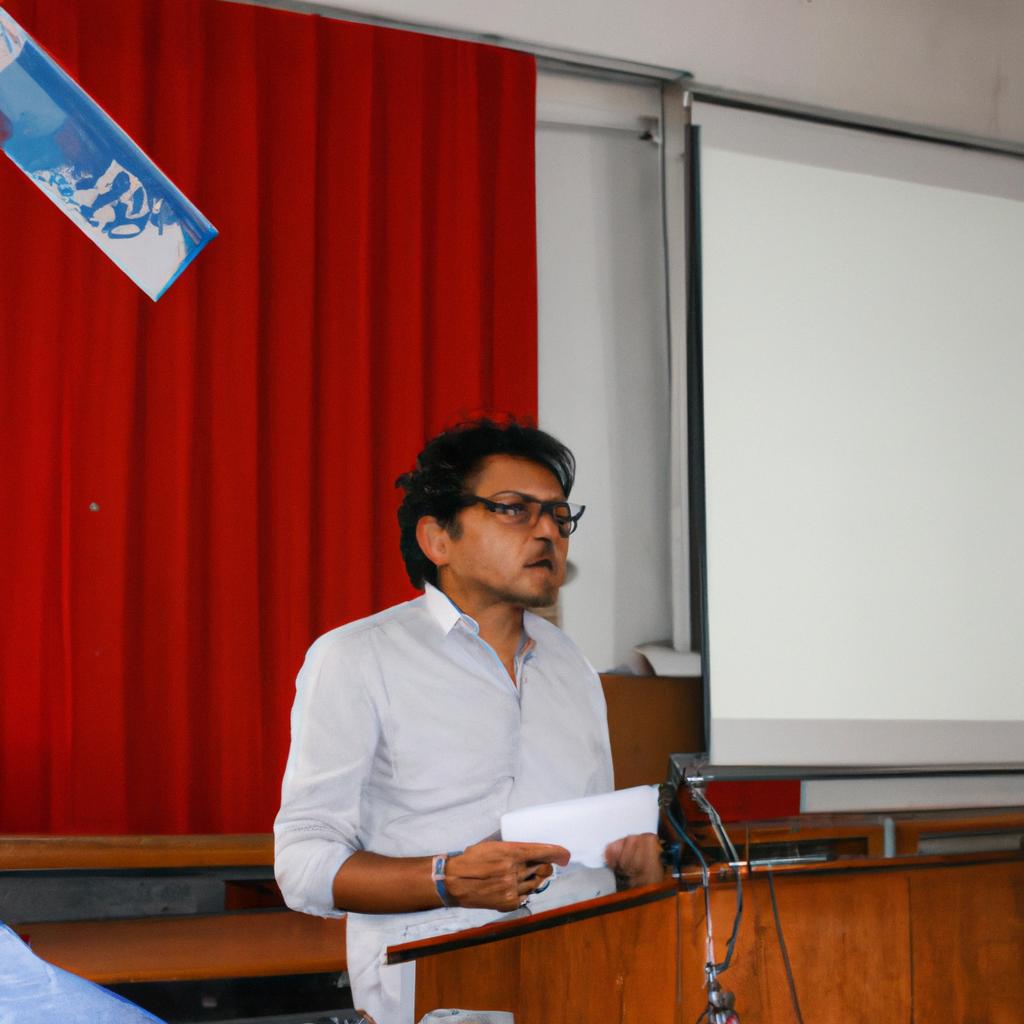In recent years, political activism within social science organizations has become an increasingly prevalent topic of discussion. From climate change advocates to human rights activists, these organizations have played a crucial role in shaping public discourse and policy-making processes. One notable example is the American Political Science Association (APSA), which has actively engaged in promoting civic engagement and encouraging its members to participate in political activities through research, teaching, and community outreach.
The significance of political science as a discipline cannot be overstated when examining the role of social science organizations in political activism. With its focus on understanding power dynamics, institutions, and decision-making processes, political science provides invaluable insights into the mechanisms that drive societal changes. Scholars within this field contribute their expertise by conducting rigorous research, analyzing policies, and providing evidence-based recommendations to inform both grassroots movements and government officials alike. It is therefore essential to explore how political science can effectively mobilize sociopolitical transformations through collaboration with social science organizations.
Definition of Political Activism
Political activism refers to the active participation and engagement of individuals or groups in political processes with the aim of effecting social change or influencing public policy. It is a manifestation of citizens’ desire to shape their society according to their values, interests, and beliefs. To illustrate this concept, consider the case study of Jane, an environmental activist who joins protests against companies contributing to deforestation in her community. Through her involvement in demonstrations, lobbying efforts, and raising awareness about the issue, Jane exemplifies political activism.
To better understand the nature and scope of political activism, it is important to highlight its key characteristics:
-
Commitment: Political activists are deeply committed to their cause and devote significant time and effort towards achieving their objectives. They work tirelessly to mobilize support, raise awareness, and challenge existing power structures that perpetuate injustices.
-
Collective Action: Political activism often involves collaboration among like-minded individuals or organizations working together towards a shared goal. By joining forces, activists amplify their impact through collective action strategies such as advocacy campaigns, coalition building, and grassroots organizing.
-
Nonviolent Resistance: While some forms of political activism may involve civil disobedience or acts of protest aimed at disrupting the status quo, nonviolence remains a core principle for many activists. Nonviolent resistance not only upholds ethical standards but also enhances legitimacy by appealing to broader sections of society.
-
Diverse Strategies: Political activism encompasses a wide range of strategies tailored to specific contexts and goals. These can include direct actions (e.g., sit-ins or boycotts), legal challenges (e.g., filing lawsuits), electoral participation (e.g., campaigning for candidates aligned with one’s agenda), or engaging in research and knowledge production.
In understanding these defining attributes of political activism, we gain insight into its significance within social science organizations—entities dedicated to studying human behavior and societal phenomena through rigorous research and analysis. By examining the role political science plays in shaping activism, we can explore how social scientists contribute to understanding and promoting effective strategies for achieving social change. This examination will be explored further in the subsequent section on the importance of political activism in social science organizations.
Importance of Political Activism in Social Science Organizations
Political activism plays a crucial role in social science organizations, particularly within the field of political science. By actively engaging in political activities, these organizations can effectively advocate for change and promote the values they uphold. To comprehend the significance of political activism in such organizations, it is essential to first understand its definition.
Definition of Political Activism:
Political activism can be defined as the intentional efforts undertaken by individuals or groups to influence or bring about changes in governmental policies, laws, regulations, or societal norms through various means, including but not limited to protests, lobbying, campaigning, and grassroots organizing. It encompasses a wide range of activities that aim to challenge existing power structures and address issues related to governance, justice, equality, human rights, and other socio-political concerns.
Importance of Political Activism in Social Science Organizations:
Engaging in political activism allows social science organizations to fulfill their broader objectives and contribute meaningfully towards shaping public discourse and policy-making processes. Here are some reasons why political activism holds significant importance:
-
Amplifying marginalized voices: Political activism provides a platform for marginalized communities or individuals whose perspectives often go unheard. By advocating for their interests and demanding greater representation, activists work toward creating an inclusive society where diverse voices are acknowledged and valued.
-
Driving systemic change: Through targeted campaigns and advocacy efforts, political activism seeks to challenge systemic inequalities and oppressive structures. These initiatives aim to dismantle discriminatory practices that hinder progress towards achieving social justice goals.
-
Creating awareness and mobilizing support: Political activism serves as a catalyst for raising public awareness on pressing social issues. By organizing demonstrations, disseminating information through media channels or educational platforms, activists seek to foster informed discussions while mobilizing support from like-minded individuals who share similar concerns.
-
Holding institutions accountable: Effective political activism acts as a check on those in positions of power by holding them accountable for their actions or lack thereof. This accountability drives transparency and ensures that decision-makers are aware of the needs and demands of the people they serve.
Table: Examples of Political Activism in Social Science Organizations
| Type of Activism | Description |
|---|---|
| Lobbying | Engaging with policymakers to influence legislation or policy decisions. |
| Grassroots organizing | Mobilizing local communities for collective action on social issues. |
| Research and advocacy | Conducting studies, publishing research findings, and advocating for evidence-based policies. |
| Coalition building | Collaborating with other organizations or groups with shared objectives for increased impact. |
By acknowledging the importance of political activism in social science organizations, we can appreciate its role as a catalyst for change. The subsequent section will delve into the historical role that political science has played in shaping activism throughout various periods, shedding light on its enduring influence on societal transformation and progress.
Historical Role of Political Science in Activism
Transitioning from the importance of political activism in social science organizations, it is vital to delve into the historical role that political science has played in driving such activism. By examining how this discipline has contributed to shaping societal movements, we can gain a better understanding of its significance today.
One noteworthy example illustrating the impact of political science on social science organizations is the case study of an organization dedicated to promoting gender equality. This organization utilizes research conducted by political scientists to identify patterns and trends related to gender inequality within various societies. Drawing upon these findings, they develop strategies aimed at addressing systemic issues and advocating for policy changes that promote equal rights and opportunities. Through their collaboration with political scientists, this organization effectively combines academic knowledge with practical action, enhancing their ability to effect meaningful change.
To comprehend why political science plays a crucial role in activist efforts within social science organizations, consider the following aspects:
- Analytical Frameworks: Political scientists provide valuable analytical frameworks that enable activists to assess power dynamics and understand how institutional structures influence society.
- Research Expertise: With advanced training in research methods, political scientists offer essential expertise in data collection, analysis, and interpretation—critical components for informing evidence-based advocacy initiatives.
- Policy Insights: Political scientists possess intricate insights into policy processes, which are indispensable when formulating effective strategies for influencing decision-making bodies.
- Intersectional Approaches: Recognizing the interconnectedness between different forms of oppression, political scientists contribute intersectional perspectives that uncover overlapping systems of discrimination and marginalization.
These contributions highlight just some of the ways in which political science enriches social science organizations’ activism endeavors. To further illustrate its significance historically, refer to Table 1 below:
| Historical Contributions of Political Science |
|---|
| Development of democratic theories |
| Examination of power relations |
| Exploration of voting behavior |
| Analysis of public opinion |
Table 1: Historical Contributions of Political Science
In summary, political science has played a pivotal role in shaping the activism efforts of social science organizations. By providing analytical frameworks, research expertise, policy insights, and intersectional approaches, this discipline empowers activists with the necessary tools to effect change. As we move forward, it is essential to explore the challenges faced by political science organizations in their pursuit of effective activism initiatives.
Transitioning into the subsequent section on “Challenges Faced by Political Science Organizations in Activism,” an examination of these obstacles will shed light on how they navigate complexities within societal structures and systems.
Challenges Faced by Political Science Organizations in Activism
Political science has played a significant role in shaping and influencing activism within social science organizations. By analyzing political systems, ideologies, and power dynamics, political scientists provide valuable insights into the strategies, goals, and challenges faced by activists. This section explores the historical role of political science in activism and highlights some of the challenges encountered by political science organizations in pursuing their activist agendas.
One notable example of how political science has influenced activism is through its examination of social movements’ impact on policy change. For instance, research conducted by political scientists on the civil rights movement in the United States revealed how strategic mobilization and grassroots organizing can lead to legislative reforms that address systemic inequalities. Such findings have inspired activists across various domains to adopt similar methods for advocating for progressive policies.
Despite its contributions, however, political science organizations face several challenges when engaging in activism:
- Limited resources: Political science organizations often struggle with limited financial resources and personnel capacity, which restricts their ability to initiate widespread campaigns or sustain long-term advocacy efforts.
- Institutional barriers: The academic nature of many political science organizations may pose institutional barriers to direct engagement in advocacy work. These organizations are bound by scholarly norms such as objectivity and impartiality, making it challenging to navigate between academia’s expectations and active participation in contentious issues.
- Public perception: Some segments of society view politically engaged scholars with skepticism or even hostility due to perceived biases or politicization of research findings. This public perception can hinder collaboration between political scientists and activists.
The table below summarizes these challenges:
| Challenges |
|---|
| Limited resources |
| Institutional barriers |
| Public perception |
While these challenges exist, they do not diminish the importance of incorporating political science perspectives into activism efforts. By addressing these obstacles strategically, both scholars and activists can harness the potential synergy between theory and practice to create meaningful societal change.
Transitioning from this discussion about the challenges faced by political science organizations in activism, the subsequent section will explore strategies for effective political activism. Understanding these strategies is crucial to overcoming the obstacles discussed above and maximizing the impact of political science within social science organizations’ activist endeavors.
Strategies for Effective Political Activism
Political science organizations often face numerous challenges when engaging in political activism. One example of such a challenge is the limited resources available to these organizations. With tight budgets and competing priorities, it can be difficult for political science organizations to allocate sufficient funds and staff time towards their activist efforts. This constraint hampers their ability to effectively advocate for policy changes or mobilize grassroots movements.
In addition to resource limitations, another key challenge faced by political science organizations is the need to navigate complex power dynamics within the political landscape. These organizations often find themselves operating in environments where various interest groups and stakeholders vie for influence over decision-making processes. Negotiating these power dynamics requires strategic thinking and an understanding of how different actors within the system interact with one another.
Furthermore, political science organizations may encounter resistance from external entities that oppose their advocacy goals or attempt to delegitimize their work. This can come in the form of misinformation campaigns, smear tactics, or legal barriers aimed at impeding their progress. Overcoming these challenges requires resilience and effective communication strategies to counter opposition narratives while maintaining credibility.
- Limited financial resources restricts funding for research projects and limits outreach efforts.
- Complex power dynamics necessitate careful alliance-building and coalition management.
- Opposition forces may engage in disinformation campaigns or legal hurdles.
- Balancing academic rigor with practical impact poses a constant tension for researchers.
Table: Challenges Faced by Political Science Organizations
| Challenge | Impact | Example Strategies |
|---|---|---|
| Limited financial resources | Reduced scope of activities | Grant applications |
| Complex power dynamics | Difficulty influencing change | Coalition building |
| Opposition forces | Hindrance to progress | Rapid response mechanisms |
| Balancing academia with activism | Struggle for credibility | Scholar-activist collaborations |
These challenges highlight the intricate landscape in which political science organizations operate, and they must develop strategies to effectively overcome these obstacles. By recognizing the limitations and complexities inherent in their activism efforts, these organizations can better position themselves for success.
Transitioning into the next section on the impact of political activism on social science research, it is evident that understanding how political science organizations navigate these challenges is crucial in comprehending the broader implications of their work. The subsequent section will explore this interplay between political activism and its influence on social science research methodologies and outcomes.
Impact of Political Activism on Social Science Research
Building upon the strategies discussed earlier, it is crucial to examine the impact of political activism on social science research. By understanding how these activities can shape and influence scholarship, we gain insight into the complex relationship between politics and academia.
Political activism within social science organizations has the potential to bring about significant changes in research agendas and methodologies. For instance, let us consider a hypothetical case study involving an organization dedicated to studying income inequality. Through their active engagement with policymakers and grassroots movements advocating for wealth redistribution, this organization influences public discourse surrounding economic disparities. As a result, researchers within the organization prioritize studies that explore innovative policy solutions addressing income inequality rather than solely focusing on theoretical frameworks.
To further understand the ramifications of political activism on social science research, several key points emerge:
- Expanded Funding Opportunities: Engaging in political activism often leads to increased visibility and support from donors who share similar ideological concerns.
- Greater Public Relevance: By actively participating in political debates and mobilizing public opinion, social science organizations have the potential to bridge the gap between academic research and societal issues.
- Ethical Considerations: Balancing objectivity while engaging in advocacy work raises ethical questions regarding bias, transparency, and accountability.
- Diverse Perspectives: Encouraging participation from scholars across various disciplines fosters interdisciplinary collaboration that enriches both research design and analysis.
| Expanded Funding Opportunities | Greater Public Relevance | |
|---|---|---|
| Pros | – Financial stability | – Broader impact |
| Cons | – Potential conflicts of interest | – Pressure to conform |
In conclusion,
Understanding the implications of political activism within social science organizations allows us to critically evaluate its effects on scholarly pursuits. The interplay between political engagement and research can lead to increased funding opportunities, heightened public relevance, ethical dilemmas, and the inclusion of diverse perspectives. As social scientists navigate this complex terrain, it is imperative to strike a balance that upholds academic integrity while actively contributing to positive societal change. Through careful consideration and ongoing dialogue, we can harness the potential of political activism to advance both scholarship and public discourse.




